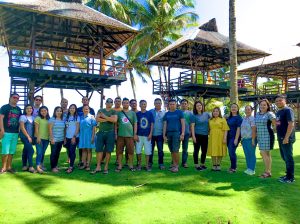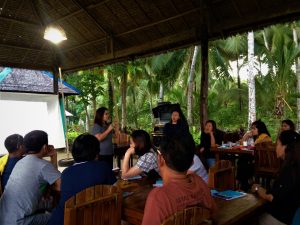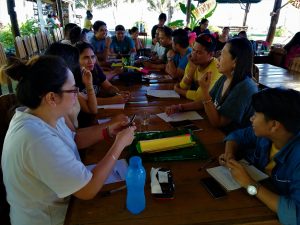“Children learn more from what you are than what you teach”- Anonymous
Rearing a child is not an easy job but an opportunity to raise the future leader of the society. So, the question is, how to raise a future leader? There is no perfect how-to guide, a perfect to-do-list, or a full-proof formula in bringing up a child – but there is a perfect way on how to build up the character of a child through discipline. This type of discipline does not cater yelling, spanking, or severe punishment.

Today’s generation, or also known as Generation Z, is a generation wherein children have an access to almost everything because of the new innovations and the fast advancements of technology. Moreover, because of the leveling up of our way of living, children are also more aggressive, inquisitive, and curious in all the things that surround them.
To support and answer their non-ending queries about life and everything, parents should be able to communicate to them in a way that they will understand. As stated in Erik Erikson’s theory about psychosocial development, you will know the approach you’ll need to communicate to a certain child according to his/her age bracket.
Proper and appropriate communication is one of the to-dos in Positive Discipline. This type of discipline promotes a method where parents clearly communicate what behaviors are appropriate and which ones are inappropriate, and what are the rewards for good behavior and the consequence for being bad.
Positive Discipline is developed by Dr. Jane Nelsen, a licensed marriage, family, and child counselor and author of Positive Discipline published in 1981.
For almost 40 years, Positive Discipline is used in homes as parents’ tool in raising responsible, strong, independent, and socially inclined children. It is an authoritative method focused on encouragement and problem solving.

To enhance the knowledge and capability of raising the clients using the method of Positive Discipline, the houseparents and staff at the Residential Care Facilities of the Department of Social Welfare and Development (DSWD) Field Office Caraga, had a three-day Orientation on Positive Discipline in Everyday Parenting for Residential Care Facilities (RCF) Staff last February 20-22,2020 at Inajakan Resort, Cantilan, Surigao del Sur.
The said activity is one of the initiatives and good practices of the Agency in promoting and consolidating reviews and ideas on how to apply Positive Discipline to the clients of Regional Rehabilitation Center for Youth (RRCY) Caraga and Home For Girls (HFG) Caraga specially taking care and providing the needs of Children In Conflict with Law (CICL).
There were five modules tackled on the said orientation: identifying long term goals, providing warmth and structure, understanding how children think and feel, problem solving, and parenting children in RCF.
Identifying Long Term Goals is basically for those parents who want to set goals on what they want their children to achieve in the future. Providing Warmth and Structure tackles emotional security, unconditional love, verbal and physical affection, respect and sensitivity to the child’s needs and empathy. Warmth encourages short term compliance and teaches long term values. Structures on the other hand include guidelines for behavior, clear stated expectations, clear explained reasons, support to help the child succeed, and negotiation. Structures help children to learn what is important, understand their mistakes, and help them find ways to fix it.
Understanding How Children Think and Feel is based on Erik Erikson’s psychosocial development theory. Wherein trust, autonomy, initiative, industry, identity, intimacy, generativity, and ego integrity are recognized and must be developed.
Problem Solving is a method wherein parents are encouraged to let their children get involved in solving family problems. According to Jessie Catherine B. Aranas, OIC-Protective Services Division (PSD) Chief of DSWD Field Office Caraga, parents need to state the problem without judging or blaming, listen to the child’s point of view (POV), paraphrase the child’s POV and acknowledge the child’s feeling, express your POV, and brainstorm solution together.
Parenting Children in RCF was discussed by Marissa Garay, center head of HFG. She highlighted the importance of involving children in matters that affect them according to their evolving capacities. She also encouraged the use a positive discipline approach and never use corporal punishment by never forcing children to participate in activities or perform acts which are against their religious beliefs/practices, never require children to perform tasks which are beyond their capability due to age and physical build, never expose children to violent video games and shows, keep children away from pornographic materials either in printed or electronic form or introduce them to obscene websites, and avoid making comparisons between and among children in terms of their social and cognitive abilities. These methods are based on Administrative Order no. 7 Series of 2015, DSWD Child Protection Policy.

As described in Dr, Nelson’s book, Positive Discipline is a kind and firm approach in disciplining children. It helps children feel a sense of belongingness and significance, is effective long-term, teaches valuable social and life skills for good character, and it invites children to discover how capable they are and to use their personal power in constructive ways.
DSWD FO Caraga is encouraging every parent and guardian to practice Positive Discipline. As the saying goes, “Kabataan ang pag-asa ng bayan”, let us spread the good news so that we can mold future leaders of our country who are compassionate, responsible, and trust-worthy. #

